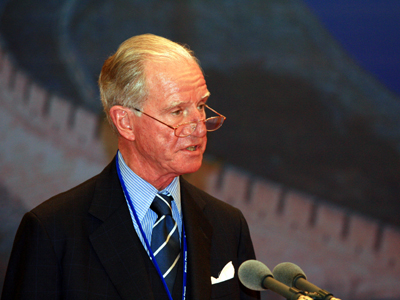
| Tuesday, September 29, 2009 |
While Burmese Prime Minister Gen Thein Sein’s speech at the United Nations assembly was nothing earth-shattering, his meetings on the sidelines should not be overlooked.
At the invitation of UN Under-Secretary-General Ambassador Joseph Verner Reed, Thein Sein met with US Sen. Jim Webb on Monday.
 |
| Burma's Prime Minister Gen Thein Sein speaks during the United Nations General Assembly at UN headquarters in New York on September 28. (Photo: Getty Images) |
The Burmese premier and Webb met in Naypyidaw in August during the US senator’s controversial trip to Burma, soon after which the US agreed to a policy of engagement with the Burmese junta.
“I appreciate Ambassador Reed's initiative in arranging this meeting, and I look forward to continuing the dialogue with Prime Minister Thein Sein that was begun last month,” Webb said in a statement prior to the meeting.
Ambassador Reed, for his part, is not unfamiliar with the Burmese regime. As a special adviser to former UN chief Kofi Annan and now to Ban Ki-moon, the high-ranking UN official is known to be close to some senior junta officers.
Sources said that Reed met with Gen Maung Aye in 1995 at the UN General Assembly and, in 2002, he attended an event marking United Nations Day in Rangoon as the guest of then Prime Minister Gen Khin Nyunt.
Ambassador Reed has a Burmese assistant working for him and his strong ties to the regime “cannot be discounted,” warned Maj Aung Lynn Htut, a former intelligence officer who was the second highest ranking Burmese official at the Burmese embassy in Washington until he defected in 2005.
During Aung Lynn Htut’s tenure in Washington, the Burmese embassy agreed to provide a visa to Sen Webb and an American businessman to visit Burma in 2001. Webb visited the country as a private citizen soon after.
Aung Lynn Htut defected to the US after Khin Nyunt was purged by Snr-Gen Than Shwe. He said he feared for his life if he returned to Burma.
He has since revealed that as soon as US President George W Bush came to power in 2001, Burmese and Americans who were sympathetic to the regime hired lobby firms in the US capital to improve the regime’s souring ties with the new US administration.
 |
| UN Under-Secretary-General Ambassador Joseph Verner Reed (Source: www.beijingforum.org) |
However, when the regime’s thugs attacked and ambushed Aung San Suu Kyi’s convoy in May 2003 in Depayin, the US tightened sanctions instead.
The former intelligence officer said the Burmese military government sent several unofficial delegations to the US in 2001 and 2002 to lobby for an easing of sanctions.
He said that many of the trips were sponsored by Burmese business tycoon Khin Shwe.
In 1997, Khin Shwe hired an American public relations company, Bain and Associates Inc, to improve relations with the US. Khin Shwe’s daughter is married to the younger son of junta no 3 Gen Thura Shwe Mann. In 2007, Khin Shwe was placed on the US sanctions list for his close ties to the regime.
Over the next few years, the ruling Burmese generals also hired lobby groups Jefferson Waterman International and the DCI Group in 1997 and 2001 respectively, in an attempt to soften their public image abroad, in particular by steering the Bush administration away from criticism of the regime’s human rights abuses and the continued detention of Suu Kyi, and to push for lifting US sanctions.
Aung Lynn Htut revealed that around 2001 and 2002 in Washington, the Burmese embassy and intelligence faction hosted several Burmese businessmen, former activists, and foreign scholars, including David Steinberg, Thant Myint-U (the grandson of U Thant), Aye Aye Thant (U Thant’s daughter), Professor Kyaw Yin Hlaing, former CIA officers stationed in Rangoon, and several US businessmen and representatives of oil companies, including UNOCAL.
He said the agenda was always the same—to lift US sanctions and to sideline Suu Kyi.
The regime also invited Japanese diplomats who harbored negative feelings toward the detained opposition leader. “We knew that Japanese diplomats and Daw Aung San Suu Kyi didn’t have good relations, so we exploited it,” said Aung Lynn Htut.
When asked why the regime had chosen to align itself with Ambassador Reed, he told The Irrawaddy in January: “We gathered information that he didn’t like Aung San Suu Kyi.”
Aung Lynn Htut said that the propaganda against Suu Kyi was subtle and aimed to demonstrate to the international community that Suu Kyi was stubborn and was an obstacle to progress in Burma.
Another old friend on the delegation to the US is Minister for Science and Technology and former Burmese ambassador to Washington U Thaung, who has previously worked with Reed in efforts to improve the regime’s brutal image.
As they gather for closed door talks once again, this time the old friends can pat each other on the back—now that the new US administration has pledged to engage directly with the junta in Naypyidaw.